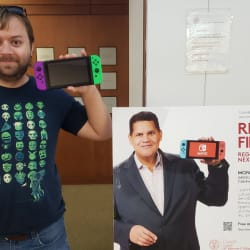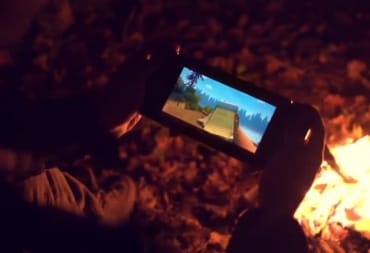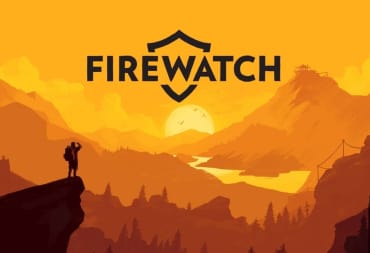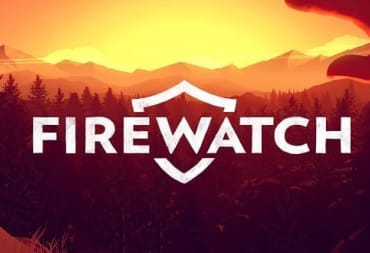Firewatch came out over five years ago and I’m still thinking about it. My initial playthrough was one spring on PlayStation 4, and then I revisited this game a couple summers ago on Nintendo Switch while on a camping trip (I wanted the full immersive experience). Everything about this game has stayed with me in that time: the characters, the story, the watercolor aesthetic, and of course the mystery. Firewatch takes on the very real, very human reality of a tragic marriage and puts you in the hiking boots of Henry, who has no idea how to move forward so he decides to spend the summer in a fire watchtower.
The Wyoming wilderness helps him confront grief in a way that he never would have been able to in his day-to-day life. The loss in this game is tangible, and it helps move the story through each mystery and breathtaking landscape. Firewatch helped me not only connect with Henry on a personal level, but the scenery and narrative in this game helped me remember that spending some time in the natural beauty of the world can be like running nature’s defrag program, especially when recovering from emotional trauma. It’s not for everyone, and certainly can’t replace clinical solutions such as a qualified therapist, but when the world becomes a bit too busy, there’s something comforting in knowing you can always wander among the trees.
Consider this your spoiler warning for the rest of the article. If you haven’t played Firewatch yet, please do. It’s a fairly short experience and one that can easily be completed in a weekend. Bonus points if you download it to your Switch and play it out in nature.
This Is Henry’s Story, But It's Also Yours
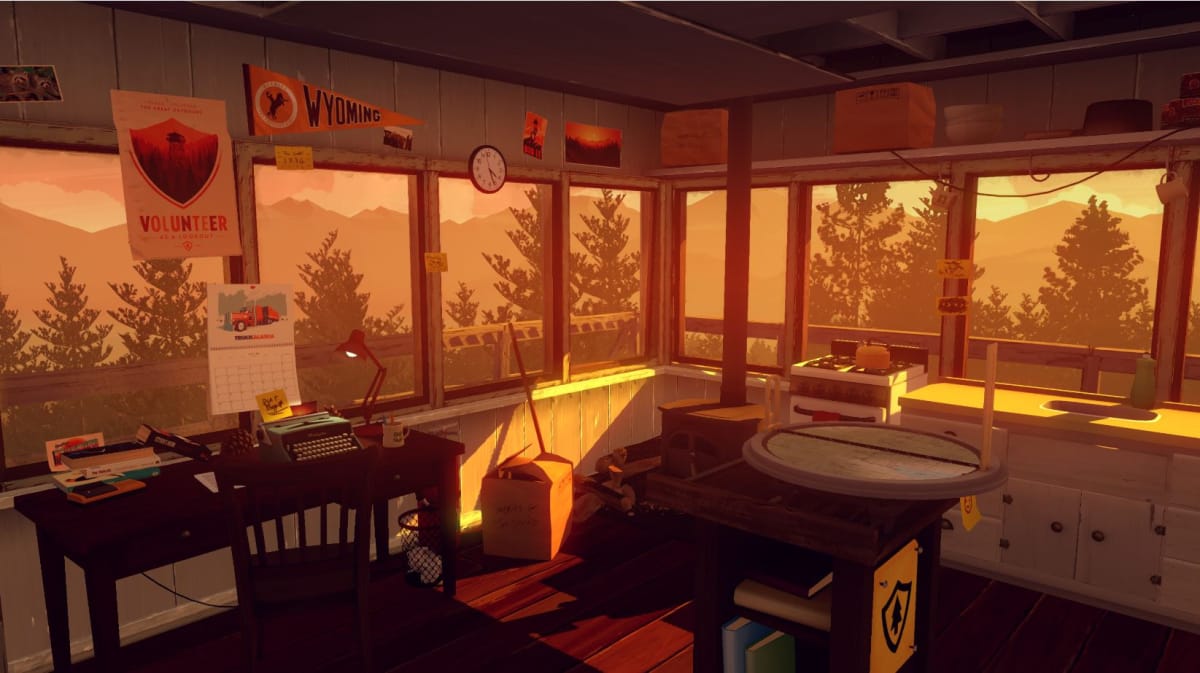
The opening of Firewatch quickly takes you through the whirlwind of the marriage between Henry and his wife, Julia. We never meet Julia, but in the first five minutes of the game we get to know her anecdotally and connect with Henry on a human level. We see their good times, their bad, their silly arguments and their huge confrontations—and the early onset dementia that Julia is eventually diagnosed with. This is an interactive story that helps you shape their backstory to an extent, and it very quickly turns from heartwarming to heartbreaking. You choose decisions that don't necessarily affect the end of the game, but they shape the narrative for what Henry, and by extension you, are going through. It’s this kind of emotional whiplash that lays at the heart of the story Firewatch is trying to tell. Henry had a life, a happy marriage, and an adopted dog he loved. The horror of Alzheimer’s took that away. Where other stories would have had Julia die tragically, Firewatch implies that she’s very much still alive, but her brain has deteriorated to a point that Henry could no longer care for her. Whether she’s residing in a nursing home in Boulder, CO, or living at home with her parents in Australia is a choice you have to make very early on. It doesn’t affect the outcome of the game, just your emotional connection to Henry as a character.
So in the Spring of 1989, without knowing what else to do, Henry takes a job as a fire lookout at Shoshone National Forest in Wyoming. Here he meets Delilah, a lookout in another watchtower visible from your watchpoint. Henry and Delilah quickly form a connection that’s a testament to the voice-acting talents of Rich Sommer and Cissy Jones. Throughout the game, Henry opens up about Julia and speaks about their life together. As the player, you have some control over how much or how little you divulge to Delilah, but as the days turn into weeks their connection builds and she remains in communication with you as you start to investigate the mystery that drives gameplay in Firewatch. Downed communication lines, a shadowy figure lurking in the darkness, and two teenage girls who go missing after Henry speaks to them combine to make the Shoshone National Forest a place of anxiety. You never know if you’re being watched from among the trees or who you might run into next. You might be out there completely alone, or there could be someone watching your every move. As this mystery unravels, Henry’s grief is explored, and he slowly comes to terms with what happened to Julia. Depending on how you decide to end the game, Henry’s ending is either a relatively happy one or one where he’s truly going to get lost in the wilderness forever. Though the game has events that transpire around Henry, your choices (and by extension, Henry’s choices) help shape the most crucial factor of the story of this game: accepting loss and how to move past immeasurable grief.
I’m not saying the great outdoors is a replacement for an entire marriage (or counseling to help come to terms with the loss of that marriage), but I think for some people it can be a start. That was one of the biggest takeaways of this game for me.
Firewatch Helped Me Not Take Natural Beauty for Granted
I’m more of an indoors kind of person. Over the past few years, however, I’ve tried to take notice of the natural beauty of the world around me. Living in New England gives me countless opportunities to experience what this planet has to offer, from the ethereal shores of Maine to the trees of the White Mountains. I enjoy camping, and this summer, after a decades-long hiatus, I’m attempting to get back into hiking. All of my newfound motivation to better appreciate what this planet has to offer is stemmed from my time spent in the Wyoming wilderness during the summer of 1989 (which was actually the Spring of 2016, but, semantics).
I’m not going to spend time waxing poetic on the healing nature of… well, nature. Countless poems and songs have already done that for me, but Firewatch manages to capture the natural wonder and beauty of the Pacific Northwest in ways that I had never seen. Maybe it was seeing the soft glow of a forest fire in the distance from your watchtower, seeing the sunset over a ravine or taking time to gaze at the endless starfield in the night sky. These are all things you can do in real life, but for many of us, we either don’t have the time or the resources to head into the wilderness for weeks at a time. Firewatch helps us capture some of that magic in our own living rooms.
I mentioned earlier how my second playthrough of Firewatch was while on a camping trip, and if you have the resources to do this, I can’t recommend it enough. Exploring the Shoshone National Forest next to a campfire and investigating a mysterious cave from the dark confines of a tent add a new level of immersion to this wonderful game. Though I don’t presently have the flexibility to take months off to hike the Appalachian Trail, or go on a weekslong camping trip, I do try to explore what natural wonders I have available to me when the timing is right, even if that means taking a walk through a state park or checking out a pond near my house. Sometimes unplugging from the constant stream of consciousness that is the internet and just being alone with your thoughts in the natural state of the world can help you work through anxiety. And if you’d rather experience nature with a friend? Well, Firewatch shows us the benefits of communication with another person.
Firewatch Voice Cast Still Impresses

Firewatch voice actors Rich Sommer and Cissy Jones are two people who absolutely understood the assignment. They breathe life into these characters in a way that makes them instantly relatable and likable. You might never see Delilah’s face, but her voice over the radio becomes a calming force that can help you when things look most bleak. She may withhold information for you at times and be borderline manipulative at others, but the bond between her and Henry creates the foundation of what makes this game work so well.
Even years after playing through Firewatch, I remember Henry’s tepid responses to Delilah’s sarcasm, and Delilah quickly realizing when she overstepped a boundary. It’s the dialogue between these two that drives the story forward and helps to flesh out more of what happened to Henry and how he ultimately ended up in that fire watchtower. Julia is a key piece to this puzzle, but so are other characters like Brian and Ned Goodwin. Most of us have one or two summers they’ll remember forever. For better or worse, the summer of 1989 in Wyoming is one that Henry will never forget.
Firewatch advertises itself as an adventure game where you explore the wilderness, but it ends up being so much more than that. From the score to the writing to the art direction, every facet of this game handles the ever-present nature of loss and how that affects one’s mental state. Exploring the wilderness starts off as therapeutic for Henry, but quickly turns to a deprecating experience when the stress of isolation gets to him and the mysteries build. Despite the lonely nature of this game, Henry has Delilah to talk with when things are difficult. And that’s where the message of this game is most potent: people are stronger together. Whether that’s with loved ones or a trusted therapist, problems always become more manageable when you speak them out loud.
And that might be the biggest takeaway I have from Firewatch: It’s fine to take a hike in the woods alone when you’re feeling overwhelmed, just make sure you have someone there to listen when you’re ready to talk.
How'd you feel playing through Firewatch? What are some of your favorite memories from this game? Let us know in the comments!
Have a tip, or want to point out something we missed? Leave a Comment or e-mail us at tips@techraptor.net

